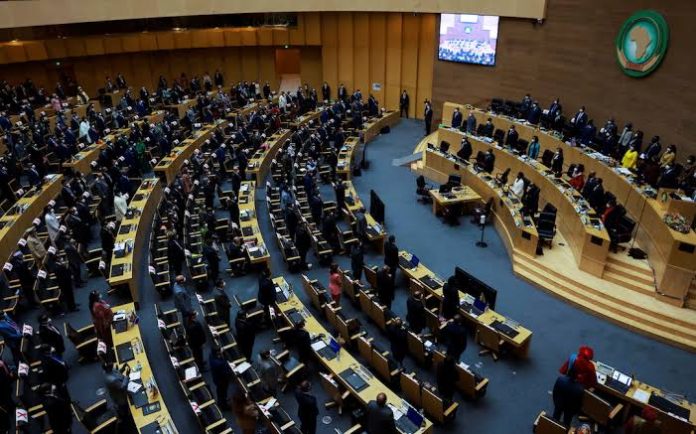Facebook Twitter (X) Instagram Somali Magazine - People's Magazine
Ethiopia has secured a seat on the African Union’s Peace and Security Council (AUPSC) for a three-year term, reinforcing its influence in regional security and diplomatic affairs. The decision was made during the 46th Executive Council meeting of the African Union (AU) in Addis Ababa, where Ethiopia emerged victorious with 38 votes, surpassing Somalia and Rwanda, which received 10 and one vote, respectively.
This election comes as the mandates of five current AUPSC members approach expiration on March 31, prompting a highly competitive selection process for the available seats. Ethiopia’s victory highlights its ongoing role in African peacekeeping and conflict resolution efforts, as the nation has now secured a position in the AU’s most powerful security body for the fifth time. The AUPSC, composed of 15 member states, is responsible for maintaining peace, security, and stability across the continent, making it a crucial institution for managing conflicts and fostering diplomatic engagement.
Alongside Ethiopia, other countries that secured seats in the AUPSC include Cameroon from Central Africa, Eswatini from Southern Africa, and Nigeria from West Africa. However, the North African seat remains vacant after no candidate managed to secure the required two-thirds majority vote. This highlights ongoing regional divisions and the challenge of consensus-building within the AU.
Ethiopia’s Ministry of Foreign Affairs celebrated the nation’s election, emphasizing its commitment to peace and security in Africa. In a statement shared on X (formerly Twitter), the ministry declared, “Ethiopia has been elected as a member of the AUPSC during the election held at the 46th Executive Council of the African Union, which commenced today in Addis Ababa. The election recognizes Ethiopia’s contributions to peace, security, and development across Africa.” This acknowledgment underscores Ethiopia’s strategic role in regional diplomacy, as the country has been actively involved in various peacekeeping missions and mediation efforts across the continent.
Somalia played a significant role in the AU’s selection process for vacant leadership positions. A high-level ministerial meeting was chaired by Somalia’s State Minister for Foreign Affairs, Ali Mohamed Omar (Balcad), with the goal of streamlining the selection of African candidates for top AU and international positions. The meeting, held in Addis Ababa, focused on ensuring transparency and fairness in the election process. Minister Ali Balcad emphasized the importance of these appointments, stating, “We have debated critical roles such as the President of the African Development Bank and the Director-General of UNESCO. Our goal is to ensure these positions are contested with fairness and transparency.”
In addition to Minister Ali Balcad, the meeting was attended by key Somali officials, including the Permanent Secretary of the Ministry of Foreign Affairs, Hamza Adan, Ambassador Abdullahi Warfaa, and other high-ranking diplomats. Somalia’s active participation in these discussions reflects its broader ambitions to secure influential positions within the AU and other global organizations.
Furthermore, Somali officials confirmed that previous obstacles hindering Ethiopia’s full participation in the African Union Transition Mission in Somalia (AUSSOM) have now been resolved. This breakthrough is expected to pave the way for finalizing Ethiopia’s troop contributions and defining its role in the mission. AUSSOM plays a critical role in ensuring stability and security in Somalia, particularly as the country continues its transition away from prolonged conflict and external military interventions. Ethiopia’s renewed engagement in AUSSOM could significantly impact regional security dynamics, given its historical involvement in Somali affairs.
Ethiopia’s election to the AUPSC highlights the shifting power dynamics within the AU, as countries compete for positions that grant them a voice in shaping Africa’s security landscape. With growing security challenges across the continent, including conflicts in the Horn of Africa, instability in the Sahel region, and political tensions in Central and West Africa, the AUPSC’s role has never been more critical. Ethiopia’s presence on the council will allow it to influence key decisions regarding peacekeeping efforts, conflict resolution mechanisms, and security strategies that impact both its immediate neighbors and the broader African continent.
As Ethiopia prepares to take on its new role in the AUPSC, the country will likely leverage its position to strengthen regional partnerships, advocate for African-led security solutions, and assert itself as a key player in the AU’s decision-making processes. The coming years will test Ethiopia’s ability to navigate complex geopolitical challenges while maintaining its commitment to fostering peace and stability in Africa.

